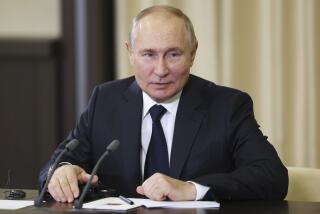Chinese, Soviets Cite Some Accord in Cambodia Talks
- Share via
BEIJING — The Chinese government and the Soviet Union have agreed that both should take steps to try to bring peace to Cambodia, but differences remain over how to achieve this, Soviet Deputy Foreign Minister Igor A. Rogachev said Friday.
“We have a very clear mutual understanding,” Rogachev told reporters at Beijing airport before leaving for Moscow after a week of talks with Chinese officials. “We see an external and internal aspect of the settlement of the Cambodia question. We have an understanding that both parties (the Soviet Union and China) can assist in progress in external aspects of the problem.”
A three-faction resistance coalition is fighting in Cambodia against an estimated 100,000 Vietnamese troops and the Vietnamese-installed government in Phnom Penh, the Cambodian capital. The Soviet Union has supported Vietnam and the Phnom Penh regime, while China backs the resistance. Vietnam has pledged to withdraw its troops by 1990, but China has expressed skepticism about this.
China has emphasized that in order to bring about an improvement in relations between Beijing and Moscow, the Soviet Union must persuade Vietnam to withdraw these troops at an early date.
Troop Withdrawal
Rogachev said Friday that the troops really will be withdrawn and that this will lead to a significant improvement in Sino-Soviet relations.
“Certainly, this meeting will push forward the process of normalization of Soviet-Chinese relations, because the Cambodian problem was a shadow,” Rogachev said in Russian to a Soviet reporter, who later translated for other correspondents. “Now the (Vietnamese) troops will be withdrawn. We hope that next year will see the total withdrawal. And this withdrawal certainly will influence in a positive way the relations between our two countries.”
Rogachev said he is satisfied with the talks here because “we managed . . . to widen the sphere of understanding.”
“We now have more common points,” he went on. “But this does not mean that we have no points of difference.”
He said the question of a meeting of Soviet and Chinese leaders was not discussed.
Chinese Deputy Foreign Minister Tian Zengpei, who represented his government in the talks, told reporters at the airport that the talks were significant, but he indicated that China still has doubts about Vietnam’s troop withdrawal.
When asked whether he believes that it really will take place next year, he said: “I hope so. We have to see what they actually do.”
And when asked about the Soviet response to two key points in China’s position--that there should be a four-party coalition government representing all Cambodian factions and that an international peacekeeping force should help enforce a peace settlement--Tian replied:
“The Soviet Union agreed in principle that the four parties should be reconciled to solve this problem. . . . We support sending an international peacekeeping force. The Soviet Union agreed in principle to international supervision, but I’m not too clear on the specifics.”
In discussions of a possible political settlement in Cambodia, the term “international supervision” has generally referred to some sort of commission of observers rather than an armed peacekeeping force. Thus, it appears that this is one of the key unresolved issues.
Regarding the internal political arrangements of a Cambodian settlement, Rogachev said, “We will approve the decision that is taken by the Cambodians themselves.”
The four factions had informal, inconclusive peace talks in Indonesia in July. Rogachev said the Soviet Union supports the convening of another such meeting as soon as possible.
More to Read
Sign up for Essential California
The most important California stories and recommendations in your inbox every morning.
You may occasionally receive promotional content from the Los Angeles Times.













